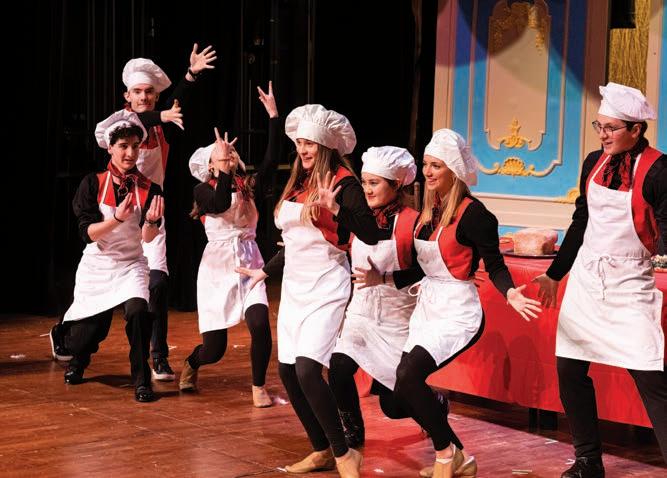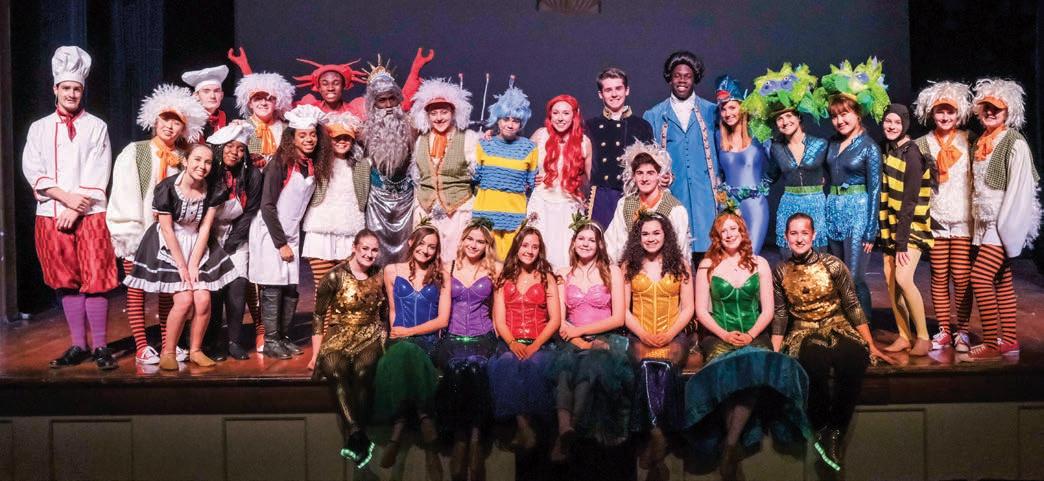
14 minute read
Learning Every Aspect of Theater Through Dramat
More than 50 students auditioned for roles in this winter’s production of Disney’s “The Little Mermaid.” They were part of a long tradition at Westminster of wanting to take part in a production of the Westminster Dramatic Association, known as Dramat.
A-men Rasheed, director of theater at Westminster, selects a play and a musical each year for the theater program to perform by taking into consideration the pool of student talent available and the desire to have as many students participate as possible. In recent years, Dramat has presented “Pippin,” “The Servant of Two Masters,” “Anything Goes,” “A Midsummer Night’s Dream,” “Urinetown,” “Peter and the Star Catcher” and “Nice Work If You Can Get It.”
Students rehearsing for “The Little Mermaid” in Werner Centennial Center.
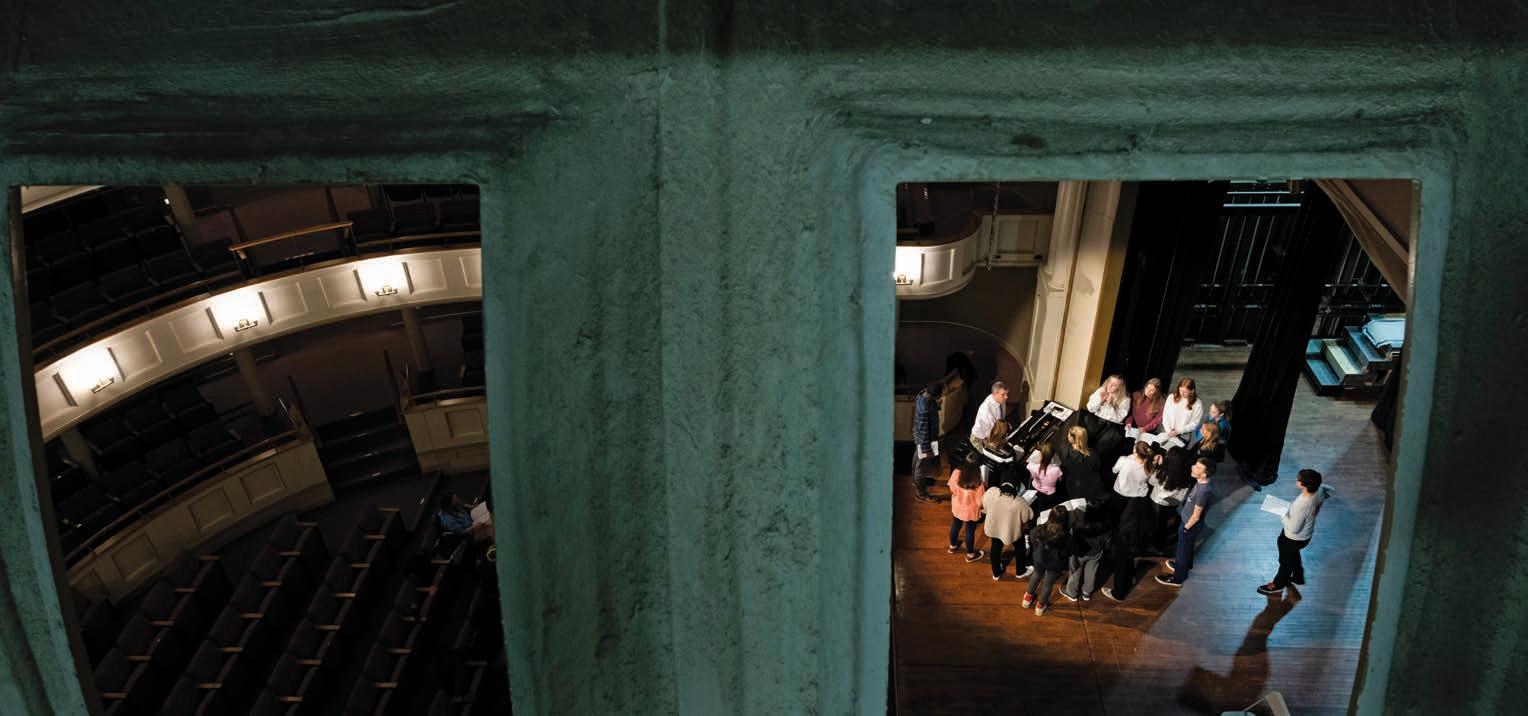
This year, two very contrasting productions were selected. The Greek tragedy “Euripides Medea” was presented in November, and Disney’s “The Little Mermaid” was performed in February.
A-men is in his 10th year on the Westminster faculty, having held a variety of previous teaching and professional theater positions. He earned a Bachelor of Fine Arts in theater at Central Connecticut State University, a Master of Fine Arts in acting from New York University and a Master of Science in Education in educational theater from City College of New York. He is a proud member of the Actors’ Equity Association. In addition to serving as theater director, he teaches Introduction to Theater and an Independent Study in Theater, serves as a form dean, and is the program director for Westminster’s Hartford Partnerships and Horizons programs.
With so many students auditioning for roles in recent productions, there are often numerous callbacks. “In the past four or five years, this process has become much more difficult because I have so many talented students from which to choose,” said A-men. “We have a large number of students with a passion to perform. I’ve had students come back multiple times for callbacks because I don’t want to choose someone without really examining the best person for the role. A lot of thought and consideration goes into the decisions.” For those students who audition and are not cast in a production, he finds those conversations difficult.
Students can go from having a lead role in one show to having a more supportive role in another. “It is important to know how to be in a supportive role because a lot of the real work comes out of those who support others in lead roles,” said A-men. “Those in supporting roles depict reactions such as empathy and help tell the story. Every single component is important. There are no small parts in theater.”
During rehearsals, A-men likes to observe what students bring to their parts. “I let them flail a little bit before I start chiseling away and getting really specific with them because I want to see what they have to offer and how they are working with other people,” he said. “I encourage them to bring forth their ideas, and then I am able to counterbalance that with what
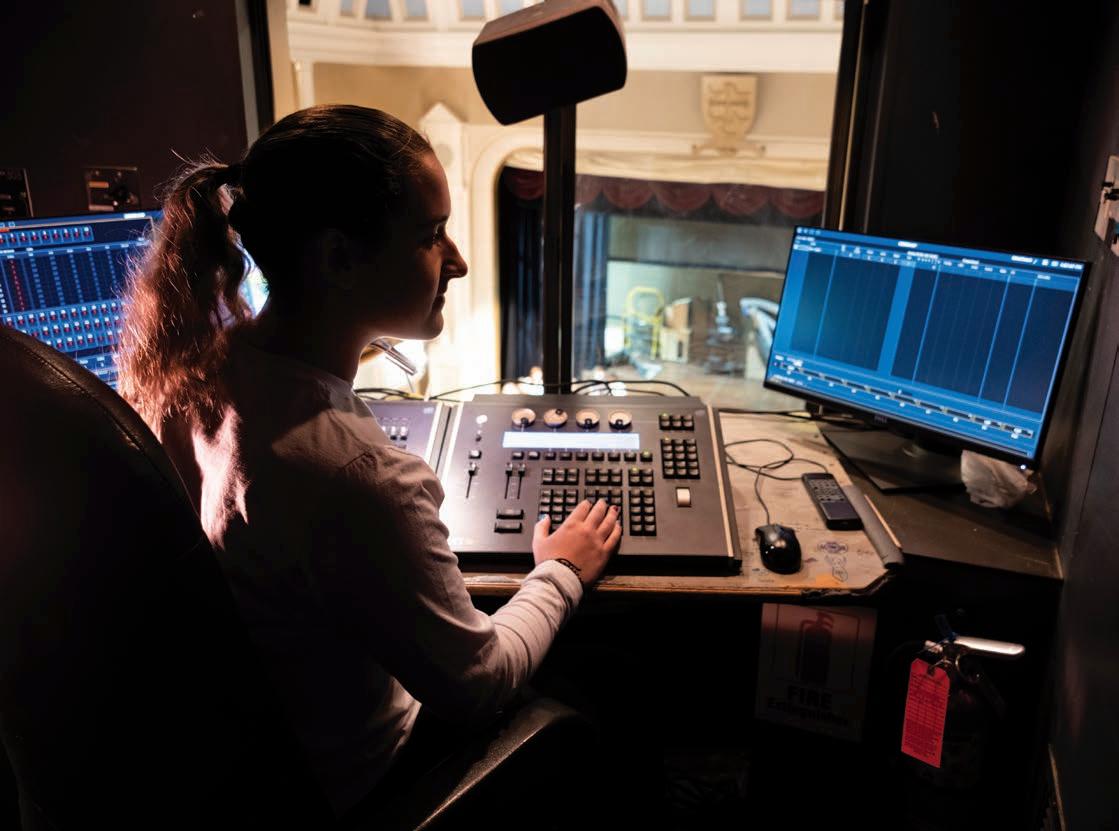
Euripides Medea
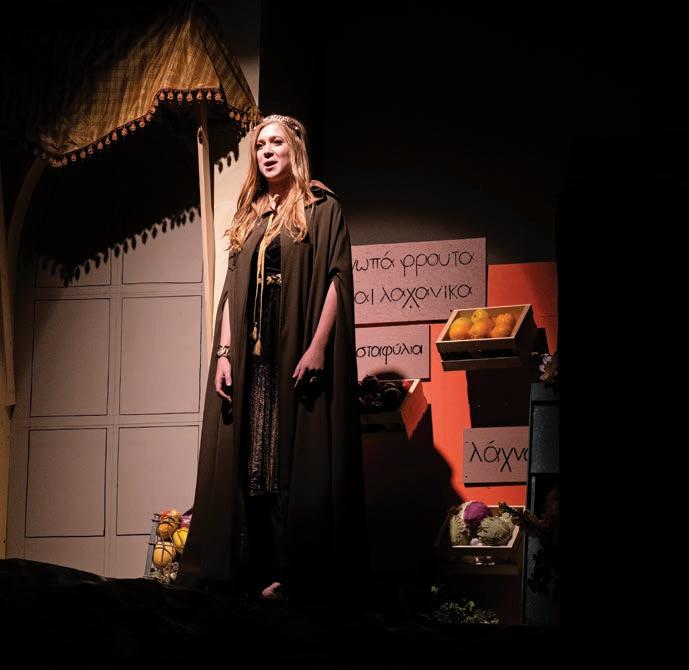

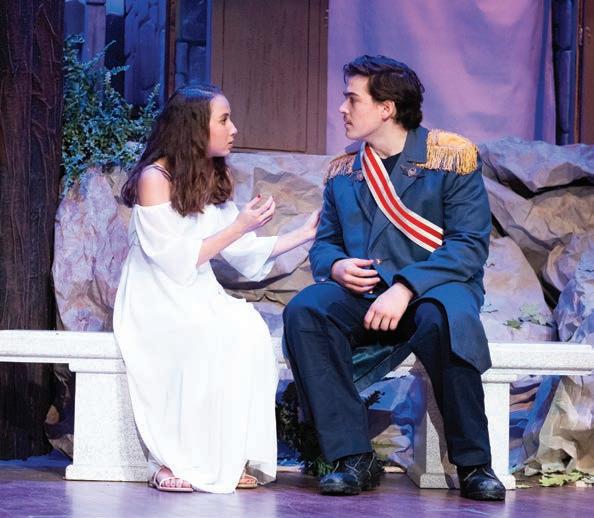
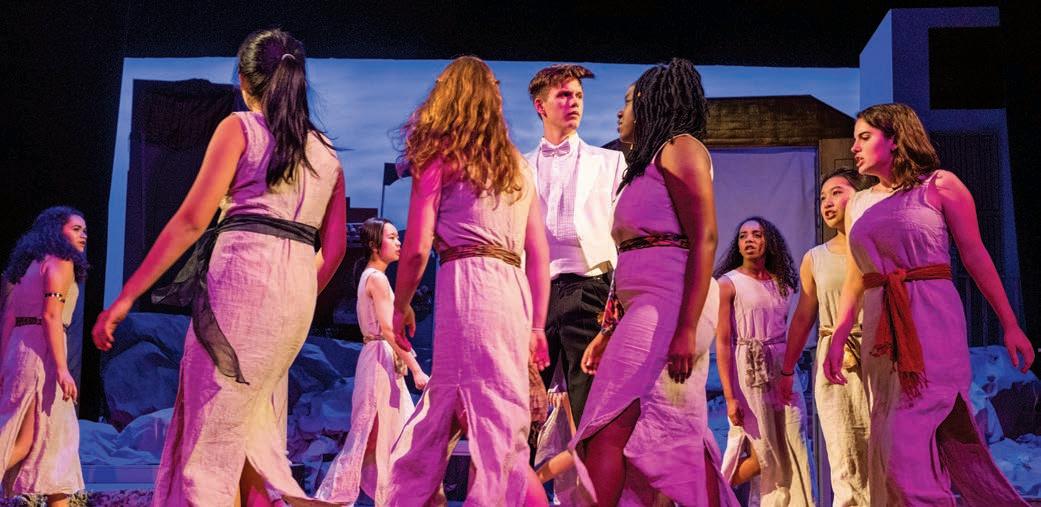
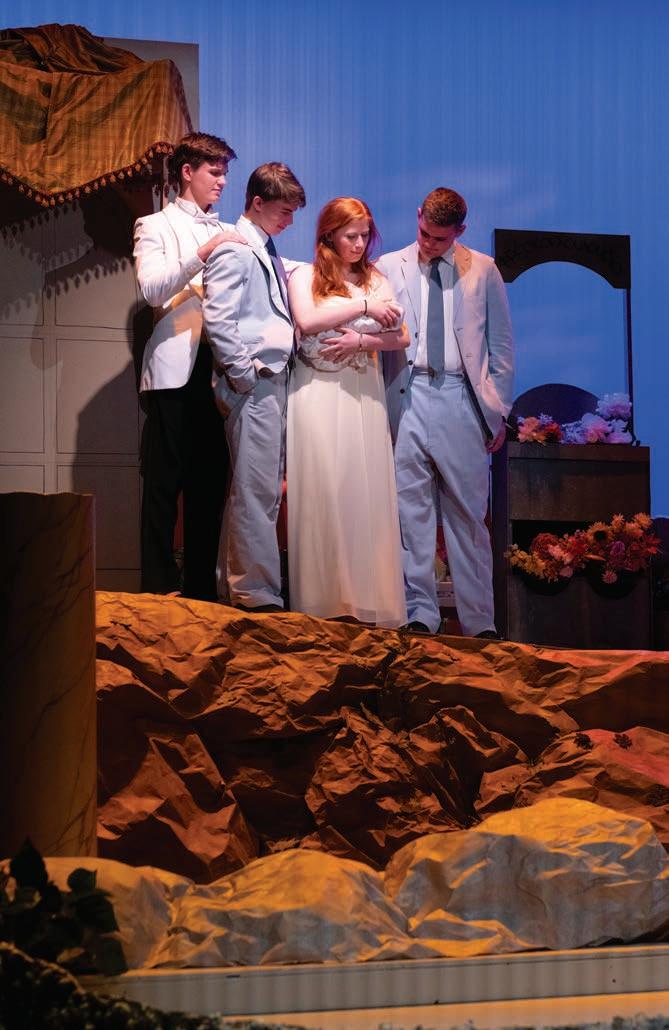
Dramat presented the Greek tragedy “Euripides Medea” Nov. 7-9 in Werner Centennial Center. In this version by Ben Power, Medea is a wife and mother who is abandoned by her husband, along with their two children, to seek a new life. She exacts an appalling revenge and destroys everything she holds dear.
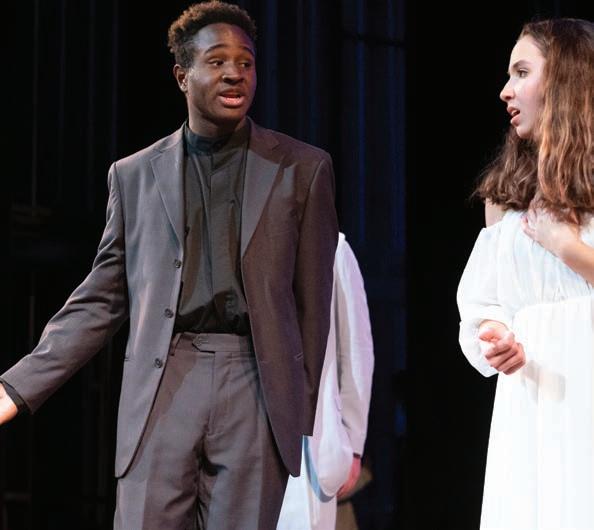
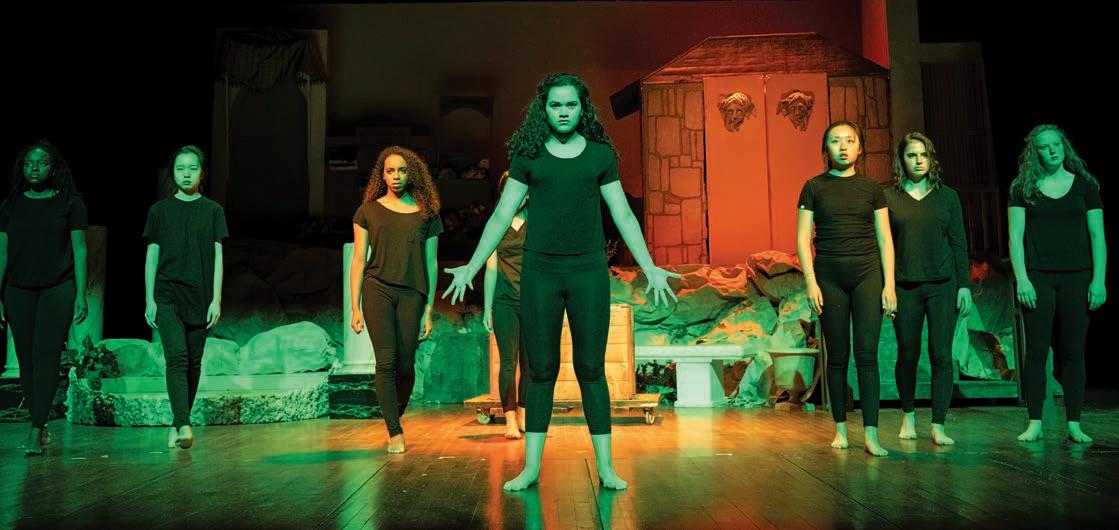
I am looking for. When we start adding the lights, the sound, the costumes and all of the other elements is when I do a major part of my directing.”
The goal for every show is to be as professional as possible. “We try to get as close to professional theater as we can with our productions and that excites the students,” he said. “It doesn’t feel like high school theater sometimes and that is remarkable onstage and backstage. The cast and crew work so hard and take so much pride in the work they do.”
Further enhancing the professionalism of the productions is the opportunity to work in Werner Centennial Center with its three-tiered theater, music rooms, dressing rooms, practice rooms and technical shop.
A-men tries to determine a student’s interests in the theater program early, so those interests can be cultivated. “Students have the opportunity to learn about every aspect of theater through Dramat,” he said. “I think it is the nature of our school. The involvement piece is key, so we try to get them learning and doing as much as they can in that environment. And students more experienced in the program are encouraged to pass on what they have learned to newer students.”
Dramat attracts students who participate in multiple school activities. “When I first started, the students who were involved were known as ‘theater students,’” said A-men. “Now, students in our program have a more robust and well-rounded affiliation with many other school pursuits, including athletics.”
A Great Example of Community
David Chrzanowski, head of the Visual and Performing Arts Department, is deeply involved with the musicals. David was appointed to the Westminster faculty in 2001 and has a bachelor’s degree in music from Bucknell University and a master’s degree in music from Yale. He also serves as director of music, and teaches Music History and Theory, AP Music Theory, Chamber Choir and Chorale.
In preparing for the musicals, he participates in auditions and collaborates with A-men on casting. “It is a real-world process and students work hard on the
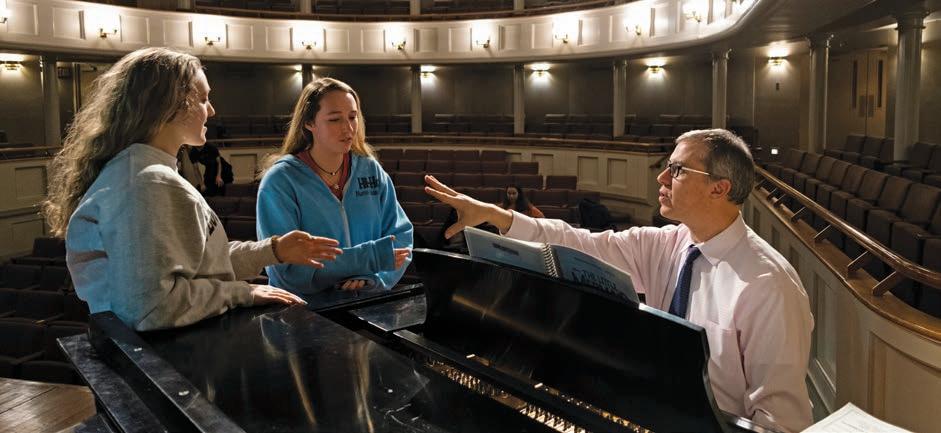
A-men teaching students in an Introduction to Theater class.
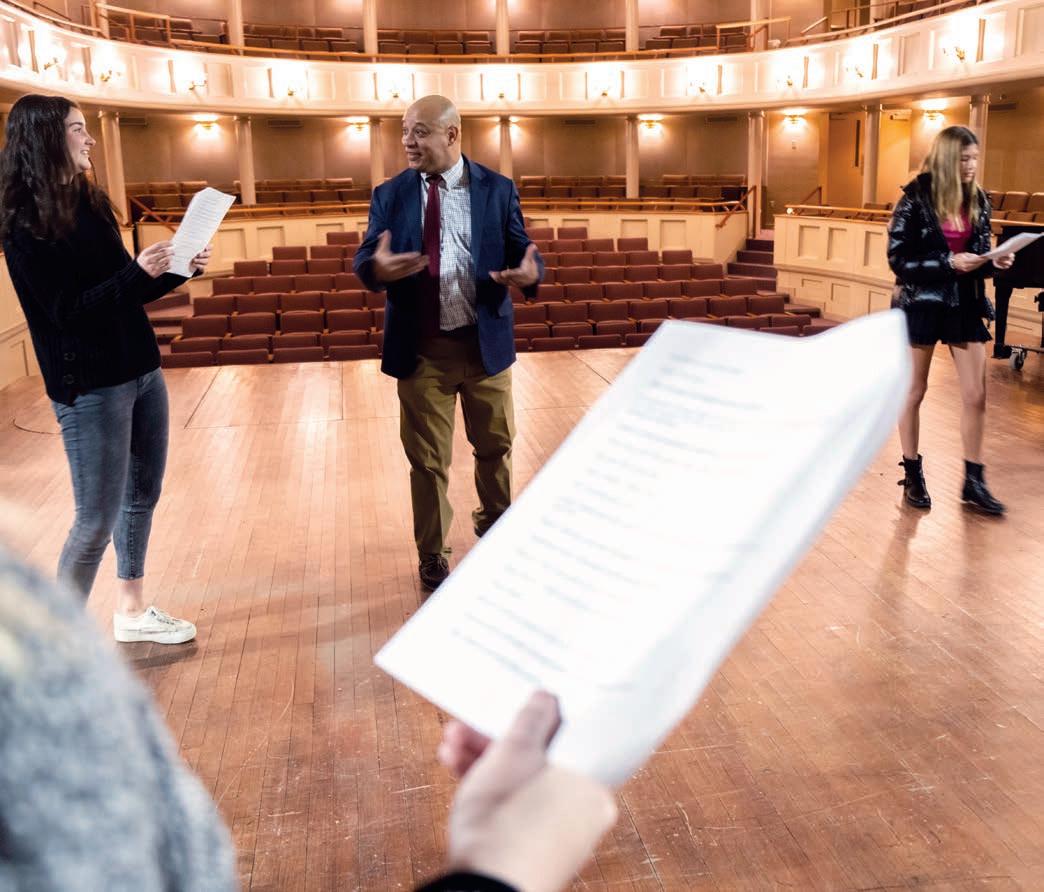
auditions,” he said. He also teaches the leads their solo parts and those in the ensembles all of the choral parts. During scene work, he often provides piano accompaniment that previews the role of the orchestra in the actual performances.
David’s biggest challenge in rehearsing for the musicals is pulling the musical parts together within the time available for preparation, usually seven-and-a-half weeks. “Even though the students are driven to succeed, sometimes they have to work beyond the bar of just being good enough,” he said. “Often, they don’t even know what they can do and need a little push to realize they can actually do something really good.”
For David, Dramat connects directly to Westminster’s core value of community. “With students in the cast, the orchestra and in tech, we can have close to 50 students working on a production such as “The Little Mermaid,” he said. “That is an eighth of the school belonging to a group that has an end goal of the performances in mind. A team atmosphere develops because everyone knows they are working together. The students who are actors and singers are supporting students who are doing the technical side of things. Musicals are one of the greatest examples of community that we have at Westminster.”
Transporting the Audience to a Different World
Critical to the success of any Westminster production is the work of the technical theater team under the direction of Bill Liebert, who serves as technical director and has worked professionally in many facets of theater throughout his career, including with Universal Studios.
In designing the set, Bill hopes to transport the audience to a different world. “I also want to make the set a playground for the actors and the director with multiple levels, entrances and exits,” he said.
Set design begins with Bill and A-men talking about ideas for the production and what they want to accomplish. This collaboration continues throughout rehearsals. Bill creates sketches and 3D models, which he shares in more final form with students working in technical theater, also called tech. This gives the students a vision of what they are building and an opportunity to share any ideas they might have.
“The models I create for each show come from the fact that Walt Disney Imagineering uses models in its previsions,” said Bill. “I enjoy making models and picked up the hobby from my father, who always had a plastic ship model he was working on.”
The models for Westminster set
As part of the technical crew, Maris Cathcart ’23 applies paint to a set piece for the musical.

designs provide scale and dimensional references as well as sight line and lighting orientations. “The models illustrate the footprint, so I can see what the audience members would see if they were sitting on the first tier or up in the third tier,” he explained. “There can be special challenges working in a three-level theater.”
The students who select technical theater as their afternoon program work with Bill six days a week to build sets in a workshop located at the rear of the theater. After undergoing extensive safety
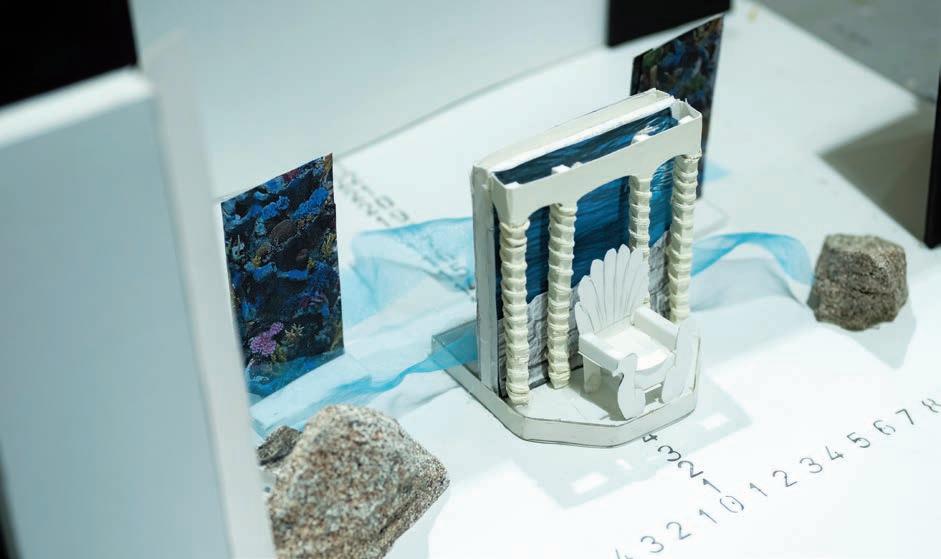
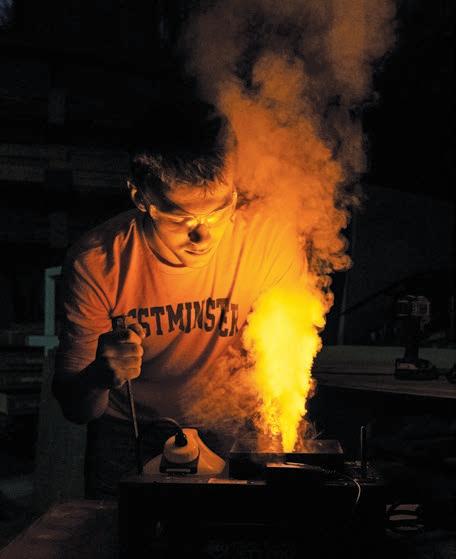
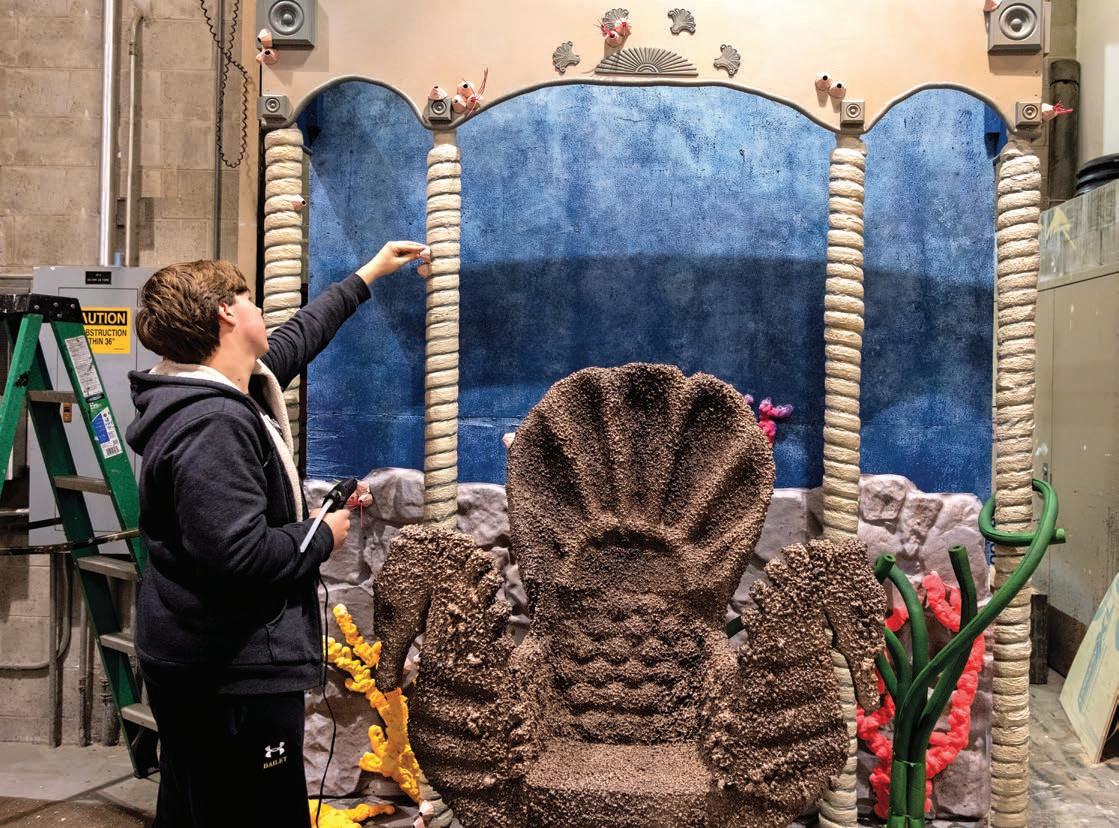
Teddy Bailey ’23 applying “barnacles” to a pillar behind King Triton’s throne for the musical.
training on the shop’s tools, students perform woodworking, apply plaster and paint, and add details with such materials as spray foam. “They work on the full workshop construction all the way through the advanced arts and crafts,” said Bill. “We even use our 3D printer to create such things as rosebuds on a cake. I really love the details and think people notice them. How can you not find joy in creating these environments?”
During performances, students in tech assume roles moving set pieces on the run crew, execute special effects, and serve as lighting and sound operators. “They learn how to design lights and work with our state-of-the-art LED light board,” said Bill. “Others learn how to control the live sound of the microphones. For ‘The Little Mermaid,’ we created more special effects than we have ever used before. Students are getting a professional theatrical experience.”
Outside resources are often brought in to help with productions, especially the musicals. A choreographer works with students on dance sequences and a costume designer from Trinity College helps with the costumes. For the orchestra, David recruits professional musicians to augment student and faculty performers.
Surrounded by People with Passion
The Dramat student organization is made up of students who have worked at least 100 hours on school productions. Members who devote 400 hours are designated Williams Hill Players.
This year’s co-presidents of Dramat are Chris Turino ’20 and Dylan Foster ’20, who have been involved with theater since arriving at Westminster. They meet with Dramat members regularly, help A-men with the daily tasks of running the program and make announcements about shows at schoolwide assemblies.
Chris, who was involved in theater growing up, knew he wanted to participate in the theater program when he was considering Westminster. During his four years on campus, he has served as an actor, a technical crewmember, an assistant stage manager and, more recently, the stage manager for both shows this year.
“What I like most about my involvement in Dramat is that I am surrounded by people with passion,” said Chris. “The work ethic of our actors
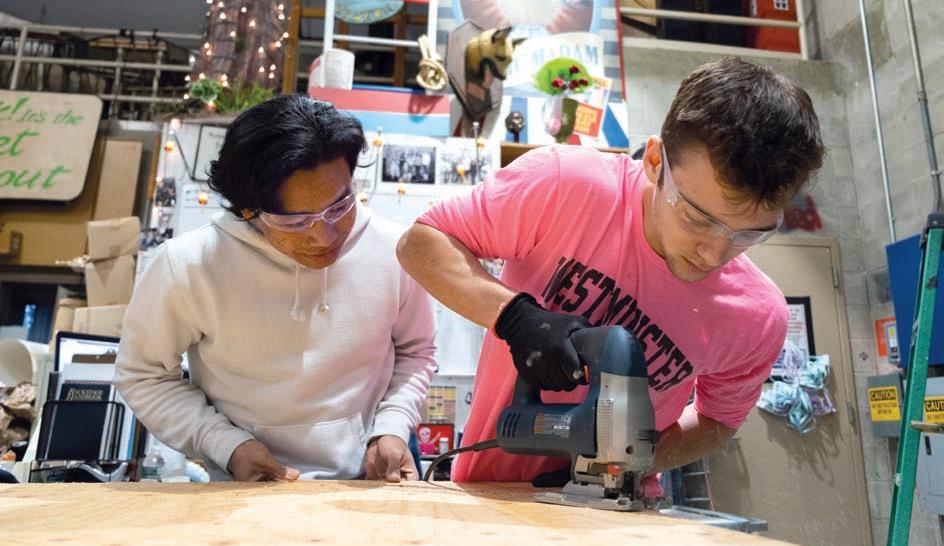
Dylan Foster ’20, far right, who is co-president of Dramat and served as assistant director of “The Little Mermaid,” works with members of the cast on a scene for the musical.
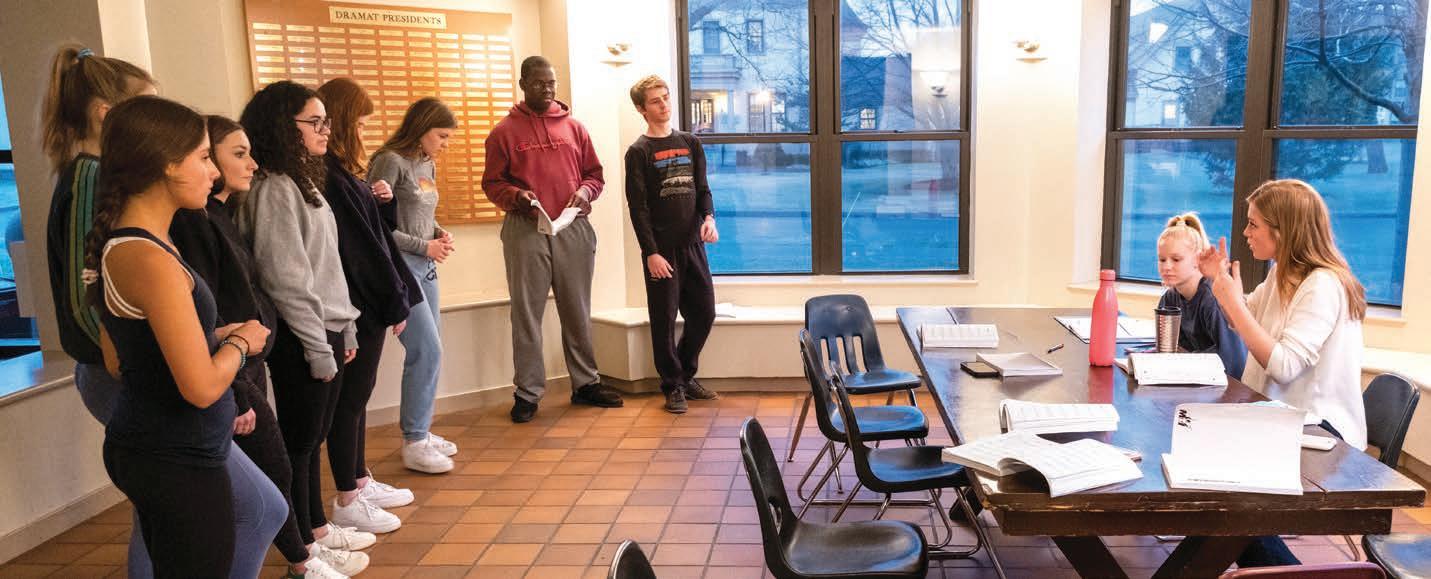
and tech members is incredible and never ceases to amaze me the closer we get to the performances. We are all committed to the theater in some capacity and grow closer because of it.”
Chris hopes to stay involved with theater in a recreational setting after he graduates from Westminster. “I’m very grateful that I’ve had the opportunity to explore all areas of our program,” he said. “A show has so many moving parts. The flexibility with which you can try out new things in Dramat has allowed me and other members to develop artistically and diversify our skill sets.”
Dylan, who has been active in theater since elementary school, selected Westminster because of the theater program. She has been involved in every Dramat production since arriving as a Third Former and took A-men’s Introduction to Theater and an Independent Study in Theater courses. This year, she has served as a teaching assistant for Introduction to Theater, played a leading role in the fall play, and was assistant director of both the play and the musical.
Dylan found inspiration for her role as co-president of Dramat from those who held the position before her. “They were wonderful mentors and leaders,” she said. “Dramat has always been such a home for me, and the idea that I am responsible for cultivating that environment for other people is such an honor.” Her participation in Dramat has had many
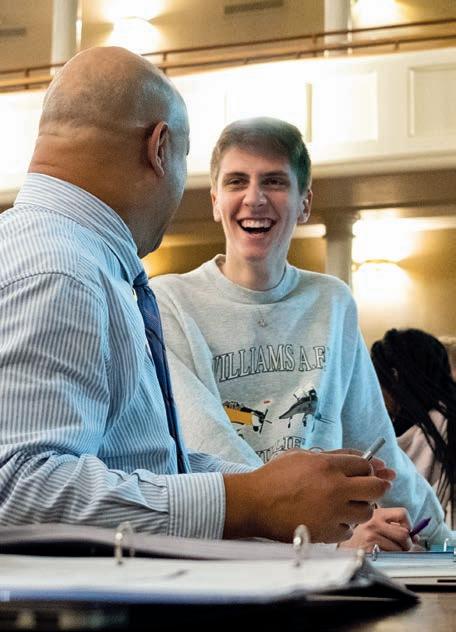
Chris Turino ’20, who is co-president of Dramat and served as stage manager for the musical, confers with A-men during a rehearsal.
benefits. “The program’s workload pushed me to become a better performer and taught me new life skills,” she said. “It made me a better public speaker, a better listener and a better leader.” Dylan plans to pursue theater in college and professionally.
A-men appreciated being able to turn to the co-presidents this year for assistance with many aspects of running the productions. “I had confidence in them and knew that the work that needed to get done would be accomplished,” he said.
Balancing Seriousness with Fun
A-men views those in Dramat like a family. “I try to keep the atmosphere as light as I possibly can,” he said. “We also enjoy each other’s company. While we joke with one another, we take the work very seriously. And when it comes to showtime, everyone is ready, both the tech and onstage people.”
He says the best feeling in the world is when the curtain closes on a performance, and he hears a roar of exhilaration from the cast and crew about what has been accomplished. “When I first arrived at Westminster, I was more inclined to make sure that people outside Dramat liked what we were doing with our productions,” he said. “Now, I am more focused on the students involved with the productions enjoying what they are doing. The greatest reward is if they feel really good about the experience.”
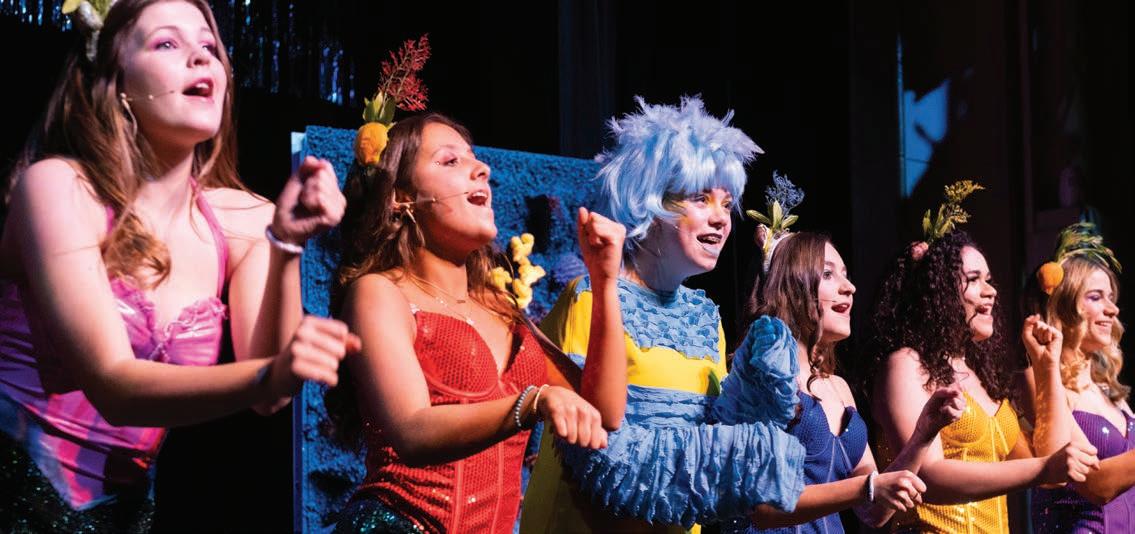
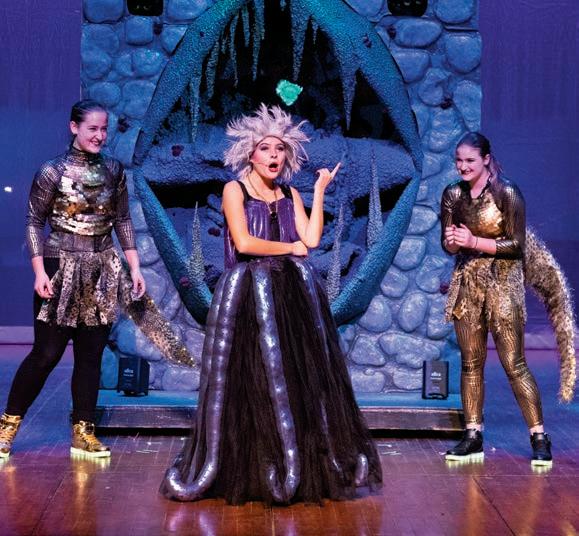
The Little Mermaid
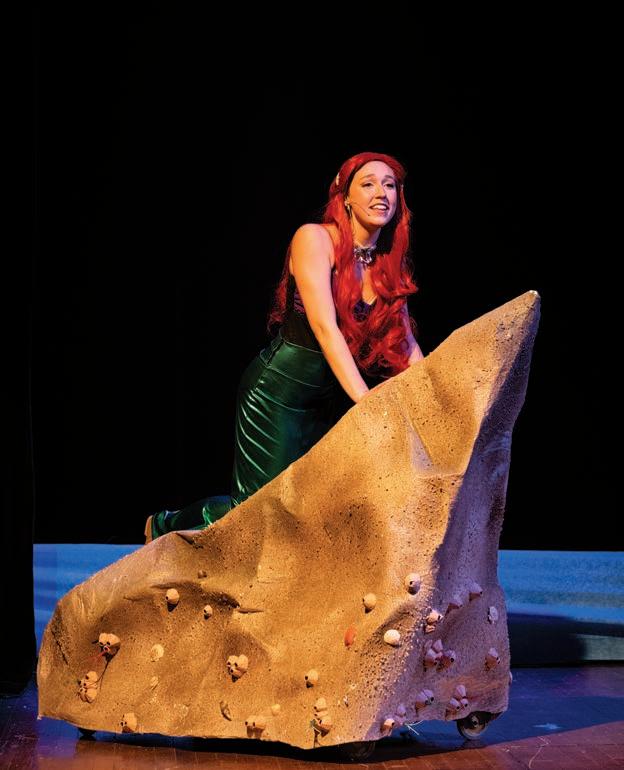
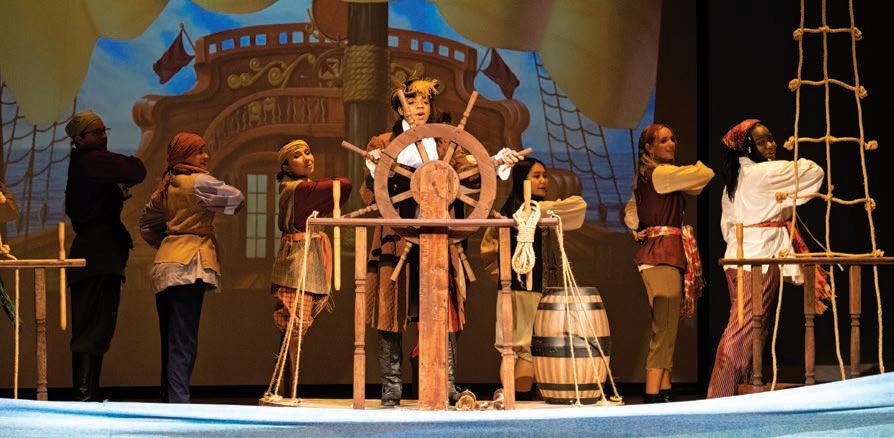
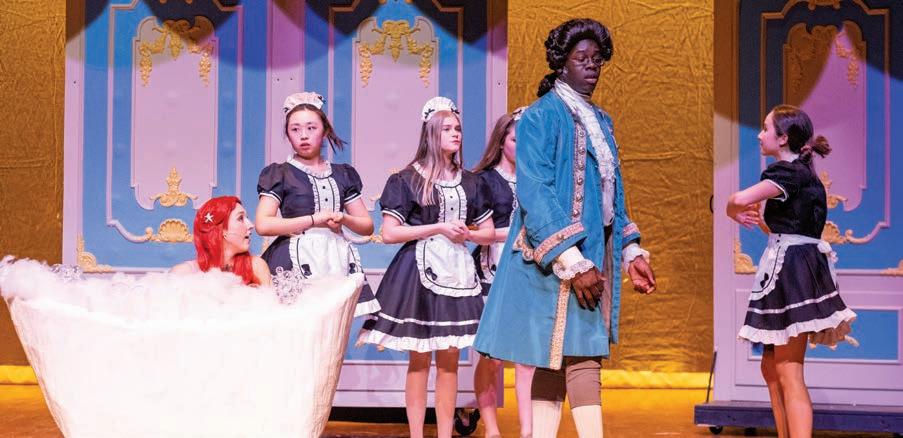

Dramat’s production of Disney’s “The Little Mermaid” played to packed houses Feb. 21-23 in Werner Centennial Center. In this love story for the ages, Ariel, King Triton’s youngest daughter, wishes to pursue the human Prince Eric in the world above. To do so, she bargains with the evil sea witch Ursula to trade her tail for legs. But the bargain is not what it seems, and Ariel needs the help of her colorful friends Flounder the fish, Scuttle the seagull and Sebastian the crab to restore order under the sea. With music by eight-time Academy Award winner Alan Menken, lyrics by Howard Ashman and Glenn Slater, and a compelling book by Doug Wright, this fishy fable captures the heart.
